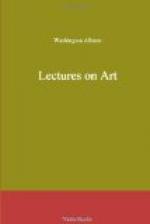These are facts; from which we may learn, that with less than a whole, either already wrought, or so indicated that the excited imagination can of itself complete it, no genuine response will ever be given to any production of man. And we learn from it also this twofold truth; first, that the Idea of a Whole contains in itself a preexisting law; and, secondly, that Art, the peculiar product of the Imagination, is one of its true and predetermined ends.
As to its practical application, it were fruitless to speculate. It applies itself, even as truth, both in action and reaction, verifying itself: and our minds submit, as if it had said, There is nothing wanting; so, in the converse, its dictum is absolute when it announces a deficiency.
To return to the objection, that we often receive pleasure from many things in Nature which seem to us fragmentary, we observe, that nothing in Nature can be fragmentary, except in the seeming, and then, too, to the understanding only,—to the feelings never; for a grain of sand, no less than a planet, being an essential part of that mighty whole which we call the universe, cannot be separated from the Idea of the world without a positive act of the reflective faculties, an act of volition; but until then even a grain of sand cannot cease to imply it. To the mere understanding, indeed, even the greatest extent of actual objects which the finite creature can possibly imagine must ever fall short of the vast works of the Creator. Yet we nevertheless can, and do, apprehend the existence of the universe. Now we would ask here, whether the influence of a real,—and the epithet here is not unimportant,—whether the influence of a real Whole is at no time felt without an act of consciousness,




